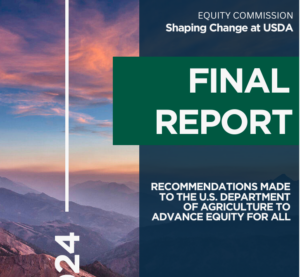After a half-dozen public meetings, the U.S. Department of Agriculture’s Equity Commission released its comprehensive look at what the agency needs to do to promote inclusivity and equal opportunity for those involved in American agriculture. The 90-page document recommends “sweeping and generational change” that would “interrupt the perpetuation of any and all USDA discriminatory and unfair systems, operations, policies and actions.”
“It’s not easy to look at mistakes head on and recognize where we miss the mark, but the Equity Commission is driving that work at USDA,” said Agriculture Deputy Secretary Torres Small. “Secretary Vilsack and former Deputy Secretary Jewel Bronaugh started the Equity Commission to build a more equitable and fair future for everyone who participates in agriculture. Today is a momentous day as we receive the final report, recognize the crucial efforts of each member of our Equity Commission and Subcommittees, and commit to the work ahead.”
Since its launch in February 2022, the USDA Equity Commission has served as a key pillar of the department’s efforts to advance equity. The Equity Commission has worked to identify how changes to USDA programs, policies, systems and practices can help lift barriers to inclusion or access and address systemic discrimination or racial, economic, health and social disparities.

The final report highlights 66 recommendations focused on nine core areas that address the USDA’s historic record of discrimination.
For many years, the USDA has failed to adequately serve Black, Indigenous and People of Color (BIPOC), many of whom were denied service and even lost their farming operations as a result. To right these wrongs, the Equity Commission’s recommendations include:
- institutionalizing equity, accountability, and improving staff diversity at the USDA;
- equitable funding for community-led land access and transition projects, technical assistance and translation services to help applicants submit applications for programs;
- support for farmworkers and their families;
- and improved access to nutrition for disadvantaged and underserved communities.
Additionally, the report asks the USDA to make changes to specific programs like conservation and procurement services by increasing set-asides for minority farmers and minority-owned businesses to participate in and partner with the agency. The commission also highlights the need for the USDA to support climate solutions targeting women and BIPOC farmers while protecting farmworkers from hazardous climate-related working conditions.
The USDA said it has taken swift action to begin addressing the recommendations that the department has the authority to implement and to ensure the department’s programs, services, and decisions reflect its values of equity and inclusion. These actions will create an organizational culture that supports, reinforces, and aims to ensure equal access to resources, closes the racial wealth gap, and addresses the longstanding inequities in agriculture.

“We encourage the USDA to work quickly at prioritizing the implementation of these recommendations to improve equitable access and resource allocation to USDA programs and services. However, there is still much work to be done to account for the 21.5 million people working in the food and agriculture system who are not adequately protected or equitably served by the USDA and other federal agencies,” said the HEAL Food Alliance, an inclusivity-driven farm advocacy group.
The Equity Commission was authorized and funded by the American Rescue Plan Act and then reauthorized by the Inflation Reduction Act. It was created as an important component of the USDA’s and President Biden’s vision in Executive Order 13985 to Advance Racial Equity and Support for Underserved Communities Through the Federal Government.
The report concluded by stating: “The Commission suggests that substantial investments, informed by rural and minority stakeholders, can bridge the gap between rural potential and achievement. A realignment of priorities, coupled with persistent evaluation, training, and policy adjustments, can fortify USDA’s role in facilitating equitable growth and affirm the right to fair access across its spectrum of influence. This commitment to equity can ensure that the USDA not only supports but also dignifies the diverse fabric of America’s agricultural legacy and rural communities, that acknowledges historical injustice while also transforming challenges into a testament of national prosperity and resilience.”


